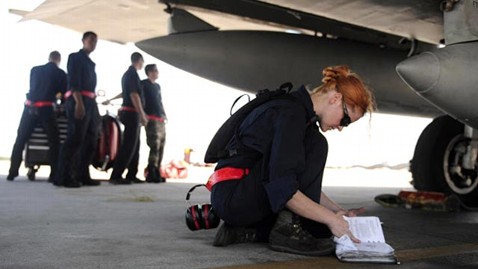Oscar-Nominated 'Invisible War' Reveals Hidden Rape Crisis in the Military
Women have reached some of the highest echelons in the military. They command fighter pilot wings and fly the president on Marine One. They have earned silver stars for courage fighting in Iraq and Afghanistan, as well as a general's four stars.
But while they may be succeeding on the front lines, there is an invisible battle that is taking its toll. According to the Department of Veterans Affairs, some 30 percent of women have been raped or sexually assaulted while serving their country, and in total numbers, more men than women are victims of sexual assault.
Shining a light on this hidden epidemic is " The Invisible War," an Oscar-nominated documentary by filmmaker Kirby Dick.
FULL COVERAGE: Oscars 2013 Awards
"I was just astounded by the statistics," Dick told "Nightline" anchor Cynthia McFadden. "Nineteen thousand men and women are being sexually assaulted each year in the United States military."
The film unveils not just the high prevalence of attacks, but also focuses on the military's response.
"We interviewed more than 50 survivors on camera," Dick said. "You keep hearing the same stories over again and again. Three times we heard a story, a woman who was single, raped by a married man. Yet, she was charged with or threatened to be charged with adultery."
Jessica Hinves is one of the many survivors who shared their stories with the filmmakers. Hinves comes from a military family and joined the Air Force, rising through the ranks to become a crew chief for an F-15.
"I was always taught that it's every citizen's duty to join the military," Hinves said. "I looked forward to retiring in the military. Unfortunately I was medically retired with PTSD from being raped."
It happened in 2009.
"I went to go to sleep and this guy was in an adjoining room and he broke in through my bathroom and raped me. [He] walked back out to the adjoining room, grabbed his book bag, didn't say anything to anybody and left. I went and got a rape kit and because the girl in the next room reported it, the case was opened."

Credit: Jessica Hinves
Hinves' case was investigated, but in the meantime she was forced to transfer to another base. Her attacker claimed that he stopped when she said no, but a court date was set to try the case.
Just days before, however, the chain of command weighed in and stopped the case from proceeding. In the military, the decision to investigate rape and sexual assault cases belongs not to law enforcement, but to the commanders. Only 8 percent of assault cases are prosecuted.
"I felt like this is a threat to justice and this is so wrong," Hinves said.
Attorney Susan Burke agrees. "It is fully controlled by the chain of command," Burke said. "It is not an impartial judicial system the way we expect as Americans. So from my perspective what we have is the very people who are the bravest among us, most willing to get out there and sacrifice to defend the nation [and] they don't enjoy the same justice that we as Americans take for granted."
Burke represents Hinves and about a dozen of other servicemen and women in a lawsuit against the military. The case was recently dismissed.
"There is a judicial doctrine that basically insulates, immunizes the military from any kind of lawsuit from civilian court. If the activity is - the buzz phrase is incident to service - so it's an occupational hazard."
Burke is appealing the decision.
As for the military, rather than criticize the film, the filmmakers say it has been used in sexual assault training programs.
"We estimate that in 2012 alone ten percent of the military saw the film," Dick said. "We hope that changes culture. But again the most important change has to come."
And that may be happening. Days after screening the film, Secretary of Defense Leon Panetta underscored that sexual assault has no place in military service and offered changes in how military assault cases are investigated and prosecuted.
But Susan Burke wants to see a change in the law. "If Congress doesn't step forward and fix it we have made our troops second class citizens in our own nation."
It is a fixable problem. "It doesn't need to take another 20 years or even a year or two," Hinves said. "This can be done immediately and effectively."